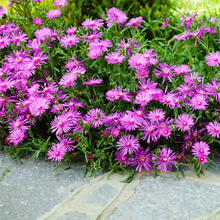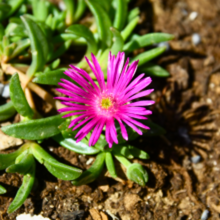Delosperma cooperi 'Table Mountain', commonly known as 'Table Mountain' ice plant, is a resilient and vibrant succulent prized for its dazzling flowers and ground-hugging growth. This Delosperma cultivar features fleshy, green leaves that form a dense mat and produces a profusion of daisy-like, magenta-pink flowers from late spring to autumn. Its drought tolerance and ability to thrive in poor soils make it a valuable addition to rockeries, slopes, and containers, adding a touch of vivid colour to dry, sunny locations. It belongs to the Aizoaceae family.
Origin: Delosperma cooperi is native to South Africa. 'Table Mountain' is a cultivar selected for its vigorous growth and abundant flowering.
Light: Delosperma cooperi 'Table Mountain' thrives in full sun. It requires at least 6 hours of direct sunlight per day for optimal flowering and growth.
Water: Water sparingly, especially once established. Allow the soil to dry out thoroughly between waterings. Overwatering can lead to root rot.
Soil: Delosperma cooperi 'Table Mountain' prefers well-drained, sandy or rocky soil. It thrives in poor soils and is tolerant of drought. Avoid heavy clay soils, which can retain too much moisture.
Fertilising: Delosperma cooperi 'Table Mountain' generally does not require fertilisation. Over-fertilising can lead to excessive foliage growth at the expense of flowers.
Pruning: Trim back any leggy growth or spent flowers to maintain a tidy appearance.
Pests and Diseases: Delosperma cooperi 'Table Mountain' is generally pest and disease resistant, but keep an eye out for slugs and snails. Root rot can occur in poorly drained soils.
Uses: Delosperma cooperi 'Table Mountain' is primarily grown as an ornamental plant for its attractive flowers and ground-covering habit. It's a popular choice for rockeries, slopes, containers, and green roofs.
Toxicity: Delosperma cooperi 'Table Mountain' is generally considered non-toxic to humans and pets.



